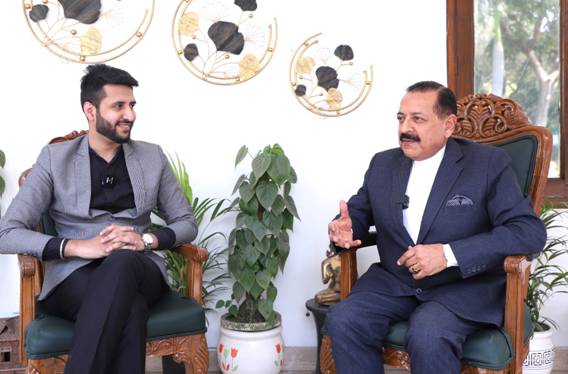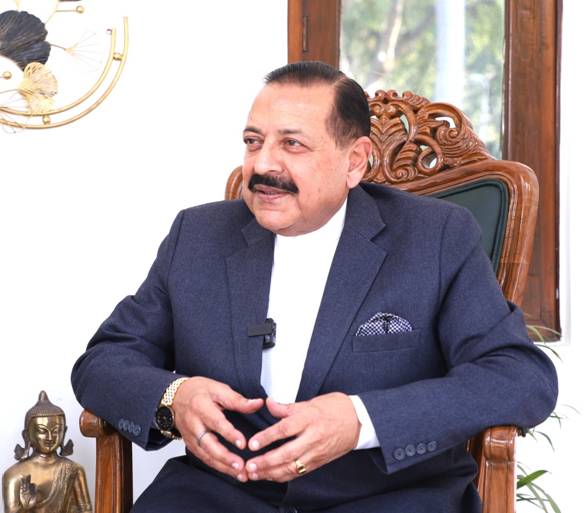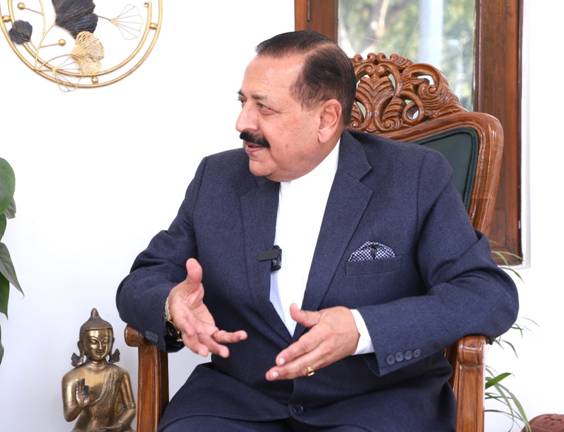Ministry of Science & Technology
India is no longer just a follower; it is now leading the way in multiple fields: Dr. Jitendra Singh
प्रविष्टि तिथि:
19 FEB 2025 3:04PM by PIB Delhi
- India’s Space Sector Soars: From Chandrayaan-3 to Bharatiya Antariksh Station, Nation Emerges as a Global Leader in Space Exploration
- India Leads Global Healthcare Innovation with DNA-Based COVID-19 Vaccine and First Herpesvirus Vaccine for Cervical Cancer
- India’s Bioeconomy Booms: From $10 Billion to $140 Billion, Poised to Reach $250 Billion with Thriving Biotech Startups
- India Pioneers Space Biology: Advancing Research in Space Medicine and Sustainable Life Beyond Earth
- India’s Nuclear Energy Vision: 100 GW by 2047 to Drive Sustainability and Global Climate Leadership
- India Rises as a Global Research Powerhouse, Poised to Lead the World in Scientific Publications by 2030
- India’s Space Economy Poised for 10X Growth, Strengthening Global Leadership in Science and Bio-Manufacturing
Union Minister of State (Independent Charge) for Science and Technology; Earth Sciences and Minister of State for PMO, Department of Atomic Energy, Department of Space, Personnel, Public Grievances and Pensions, Dr. Jitendra Singh has asserted that India is no longer just a follower but is now setting global benchmarks, offering leadership and pioneering innovations across sectors. He highlighted the remarkable advancements India has made in recent years, in the fields of space, biotechnology, and nuclear energy etc positioning itself as a key player on the world stage.

Dr. Jitendra Singh pointed out that India’s space sector has witnessed an unprecedented transformation, with a surge in ambitious missions and international collaborations. The Space Docking Experiment (SpaDeX) is a testament to India’s technological progress, paving the way for future space missions, including Gaganyaan, Chandrayaan-4, and the Bharatiya Antariksh Station, India’s upcoming international space station.
India has also emerged as a preferred destination for satellite launches, earning global credibility. The nation has successfully launched 433 foreign satellites, of which 396 were deployed in the last decade alone, generating $157 million and €260 million in revenue from 2014-2023. The historic success of Chandrayaan-3, which made India the first country to land near the Moon’s south pole, has positioned ISRO at the forefront of lunar exploration. The world’s leading space agencies, including NASA, are now awaiting India’s findings from the Moon’s southern pole, a milestone that underscores the nation’s rising dominance in space research.
The Minister also highlighted India’s pioneering role in biotechnology and bioeconomy. India became the first country to develop a DNA-based COVID-19 vaccine, demonstrating its leadership in vaccine research and development. Furthermore, India has introduced the first herpesvirus vaccine for cervical cancer, reinforcing its position as a leader in preventive healthcare.
India’s bioeconomy has surged from $10 billion in 2014 to nearly $140 billion today, with projections to reach $250 billion in the coming years. The number of biotech startups has skyrocketed from just 50 in 2014 to nearly 9,000 today, making India a global hub for biotech innovation. In bio-manufacturing, India now ranks third in the Asia-Pacific region and 12th globally, with its influence expanding rapidly.

India has also taken a bold step into space biology, laying the foundation for human survival beyond Earth. ISRO and the Department of Biotechnology have signed an MoU to advance space biotechnology research, focusing on growing plants in space to sustain long-term space missions. The study of space medicine and human physiology in extraterrestrial environments is becoming a critical area of research, and India is now setting global standards instead of just following them.
India’s nuclear energy program, once met with scepticism, is now recognized for its peaceful and sustainable ambitions. The country has set an ambitious target of 100 gigawatts of nuclear energy by 2047, aiming to reduce carbon emissions by 50%, a commitment that is influencing global climate strategies. The world has now acknowledged India’s nuclear policy, which was envisioned by Homi Bhabha for peaceful purposes, as a model for responsible energy development.

India’s scientific output is gaining global recognition, with the country now ranked fourth worldwide in scientific publications. Projections suggest that by 2030, India could surpass the United States to become the world’s top-ranked country in scientific research.
India’s space economy is set to grow 5 to 10 times in the next decade, further solidifying its leadership. The nation’s rapid economic ascent is evident in its global rankings, including its 12th position in bio-manufacturing and fourth place in scientific research publications.
Dr. Jitendra Singh concluded by emphasizing that India’s rise is no longer just about catching up but about setting the agenda for the world. “The clock has turned 360 degrees. Earlier, we learned from others; now, the world is looking up to us. The traffic is both ways,” he remarked.
*****
NKR/PSM
(रिलीज़ आईडी: 2104674)
आगंतुक पटल : 1975